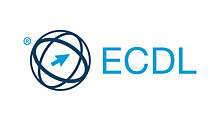European Computer Driving Licence

The European Computer Driving Licence (ECDL), also known as International Computer Driving Licence (ICDL) in non European countries, is a computer literacy certification programme provided by ECDL Foundation[1] a not-for-profit organisation.
ECDL / ICDL certification is a globally recognised information and communication technology (ICT) and digital literacy qualification.[2] Other than the name, there is no difference between ECDL and ICDL and they are recognised as equivalent.[3] According to ECDL Foundation, over 14 million people in over 100 countries had registered as candidates for ECDL.[4]
In 1995, the ECDL certification programme was developed through a task force of the Council of European Professional Informatics Societies (CEPIS) and was recommended by the European Commission High Level Group, ESDIS, to be a Europe-wide certification scheme.[5] In the UK, it is used by the National Health Service as the benchmark IT qualification and as such it is available without charge to all staff.[6]
Testing
In order to take the tests, a candidate buys an ECDL Skills Card, which usually is issued electronically and serves as a login to the testing platform. To prepare for a module test, the candidate may use ECDL diagnostic tests.[7] Testing is done using software which simulates the Windows/Microsoft Office environment. The candidate's mouse movements and keystrokes are monitored and the result of the test is reported immediately after the test is completed.[2]
New ECDL / ICDL
Since 2013, the syllabus has been divided into 18 modules on three levels:
- Base Modules
- Computer Essentials
- Online Essentials
- Word Processing
- Spreadsheets
- Intermediate Modules
- Presentation
- Using Databases
- IT Security
- Online Collaboration
- Image Editing
- Web Editing
- Project Planning
- 2D Computer Aided Design
- Health Information Systems Usage
- ICT in Education
- Advanced Modules
- Advanced Word Processing
- Advanced Spreadsheets
- Advanced Database
- Advanced Presentation
Original ECDL / ICDL
Until 2013 the ECDL/ICDL syllabus was divided into seven modules.[2][8] These are:
- Security for IT Users
- IT User Fundamentals (Windows Explorer in Windows 7)
- Word processing (Microsoft Word 2010)
- Spreadsheets (Microsoft Excel 2010)
- Databases (Microsoft Access 2010)
- Presentation program|Presentations (Microsoft PowerPoint 2010)
- Using Email and the Internet (Windows Explorer in Windows 7)
Additionally, there was an Advanced version that was divided into four modules. These are:
- Advanced Word Processing
- Advanced Spread sheets
- Advanced Presentation
- Advanced Database
Many training centres used Microsoft software (the applications used are shown in parenthesis) but other software environments could be used, such as Apache OpenOffice/LibreOffice.
References
- ↑ "ECDL Foundation". Retrieved 7 August 2012.
- 1 2 3 "European Computer Driving Licence". UCL Information Services Division. University College London. Retrieved 29 November 2013.
- ↑ Poulter, A.; McMenemy, D. (1 January 2004). "Beyond the European Computer Driving Licence: basic and advanced ICT skills for the new library professional". IFLA Journal. 30 (1): 37–46. CiteSeerX 10.1.1.140.9351
 . doi:10.1177/034003520403000107.
. doi:10.1177/034003520403000107. - ↑ "About Us - ECDL Foundation". News archive. ECDL Foundation. Retrieved 29 March 2016.
- ↑ "eEuropeTargets 2001/2002". European Commission. 2 July 2007. Archived from the original on 28 June 2008. Retrieved 2007-10-12.
- ↑ Townley, S. A. (November 2004). "European Computer Driving Licence". Anaesthesia. 59 (11): 1145–1145. doi:10.1111/j.1365-2044.2004.03989.x. Retrieved 29 November 2013.
- ↑ ECDL site with all diagnostic tests
- ↑ "ECDL/ICDL Syllabus version 5.0" (PDF). ECDL Foundation. Retrieved 29 November 2013.
External links
| Wikiversity has learning materials about European Computer Driving Licence |
| Wikiversity has learning materials about International Computer Driving Licence |
| Wikiversity has learning materials about International Computer Driving Licence |
| Wikiversity has learning materials about International Computer Driving Licence |
| Wikiversity has learning materials about International Computer Driving Licence |